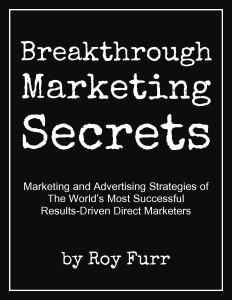
My upcoming book, Breakthrough Marketing Secrets, which I’m writing while you watch on this site and in my daily emails!
Hey there Rainmaker, here’s the next chapter in the book I’m writing while you watch…
By the time you’re reading this, I should be at LEGOLAND in Kansas City, hanging out with the family.
Which I think is appropriate for today’s chapter.
Because today’s chapter is about building the business you want, through active effort.
I wouldn’t have the business I have, nor the success I have, if it weren’t for me proactively making it so. I wouldn’t be taking the day off to start the weekend early, and enjoy a short road trip. I wouldn’t spend so many hours throughout every week, hanging out with the kids.
Depending on what you cultivate, your business can be a lot of things to you. It can be a source of income and wealth. It can be a source of freedom. Or, if you don’t cultivate something better, it can end up as just another moderate-paying job, but with a lot more responsibility.
It’s up to you to decide what you want it to be — then get to “Working On Your Business, Not In Your Business.”
—
You must work on your business, in addition to working in your business.
You’ve heard it many times before, no doubt. Either through Michael Gerber’s The E-Myth, or elsewhere.
And it’s true. Often, the higher up you get in business or the more your business grows, the less productive your days become. Between meetings, “got a minutes,” and other demands for your time, the amount of purely productive time in your business drops near zero.
When he was President and CEO at Chrysler, Lee Iacocca once said he was lucky to get 30 truly productive minutes in a day.
You may get more or less productive time than Iacocca. But one thing is for certain. You don’t get enough time to work on your business.
Between interruptions, “emergencies,” and everyday distractions, your days seem to disappear without you ever really knowing where they went.
The good news is that they don’t have to.
But you have to take a stand. YOU have to do something about this, if you ever want it to change.
It’s up to you to turn off your cell phone, turn off your email, cancel the meetings, make sure your staff knows they’re empowered to make any decision that doesn’t literally impact the life of the company…
And hide.
And then, go to work on your business.
I have a prescription for you…
By the time you’re done reading this book, I want you to schedule AT LEAST a half-day outside the office. Preferably, a full day.
(If you insist on doing it in the office, fine. Lock yourself behind a closed door, and hang a “NO INTERRUPTIONS” sign up where the world can see it. And when you say “no interruptions,” make sure you mean it!)
Spend this time asking yourself important questions about your business. Spend this time looking at specific ways you can grow your business. Increase profits. Reduce stress. Automate. Create systems that remove you from the critical functions of your business. Free up your time. Outsource or delegate.
Come up with specific action items — from this book or elsewhere — that you can implement immediately to get your business working harder for you, and reduce how much you work for it.
As an aside, this is something clients regularly ask me to participate in with them. Uncovering opportunities through these “working on your business” sessions. If you need a qualified consultant to come along for the ride, and help you make this happen… Hire them. Whatever you need to do to make it happen, do it. It’s well worth the investment.
I forget the source of this quote, but this stuck with me the first time I heard it:
“Any business that requires me in its day-to-day operations after three years isn’t a business, it’s a job.”
You can make your business work for you. You can make it grow and succeed far beyond the amount of work and effort you put into it. But you have to plan for it and make it happen. It will not happen on its own.
The default?
A business where the leader guides massive reactions to anything that comes up. A business that can only respond — at the whim of its leader — and not expand. A business that’s just another job — with the added hassles of running a company on top of it.
The alternate and the ideal?
A business that is proactive. A business with systems in place to accomplish all the major goals, and even for dealing with the unexpected. A business that will survive and even thrive if its owner is gone for months or years at a time. A business that will last 100 years, even if the owner were to stop working in it today.
Which of those describes your business?
What your business is today is a result of everything you’ve done up until now.
What your business will be tomorrow is a result of everything you do from here forward.
Now is when you have to make the important decisions.
It’s your choice.
And the single-best way you can make sure that your business moves toward the ideal — where it can PAY YOU for life, even if you simply stop showing up — is to follow this prescription.
Do it regularly. Seclude yourself, with your top team members, if your business’ size warrants. And work ON your business, rather than working IN your business.
—
Yours for bigger breakthroughs,
Roy Furr
Editor, Breakthrough Marketing Secrets



